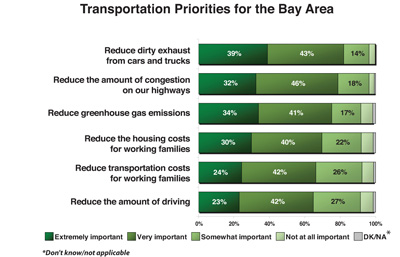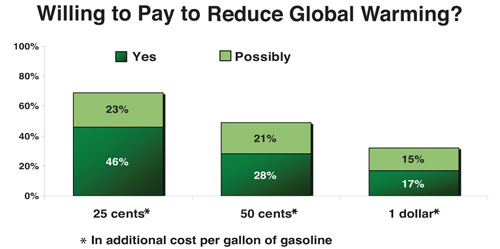Bay Area residents express high levels of concern about air quality and global warming impacts, and they show a willingness to accept denser development in their neighborhoods for the sake of open space and clean air in the region.

By Joe Curley
Published: December, 2007
These are some of the key findings of a recent public opinion survey on transportation planning priorities commissioned by the Metropolitan Transportation Commission (MTC). The telephone poll was conducted as part of the outreach effort for Transportation 2035, an update of the long-range regional transportation plan for the San Francisco Bay Area.
When asked to assess the importance of a range of transportation-related priorities, respondents said reducing vehicle-caused pollution should be the region’s top goal. Eighty-two percent of respondents believe this is extremely important or very important to the transportation future of the Bay Area. Not surprisingly for a region with the second-worst congestion problem in the nation, respondents ranked congestion relief on highways as the next most important priority, with 78 percent of the sample saying that this is an extremely important or very important regional goal. Rounding out the top three is reducing greenhouse gas emissions, which 75 percent of respondents believe is extremely important or very important for the region.
Digging deeper on the issue of global warming, the poll asked respondents: How important is global warming when considering how we plan for transportation and land use in the Bay Area? Nearly two-thirds of the sample — 65 percent — answered that global warming is extremely important and should be one of the highest priorities in transportation planning.
In an indication of how seriously the region’s residents view global warming, 69 percent of respondents said they would consider paying 25 cents more for a gallon of gasoline if it would be used to limit or reduce global warming. Specifically, 46 percent of the sample said yes, they would be willing to pay, while another 23 percent said they would possibly be willing to pay. Predictably, support fell off at the higher-cost levels of 50 cents per gallon and $1 per gallon.To explore attitudes toward land use — an increasingly important factor in transportation planning — the survey probed Bay Area residents’ willingness to make trade-offs when choosing a place to live. In this case, nearly three-quarters of respondents said they would prefer a small home with a small backyard (if it meant a short commute to work), to a large home with a large backyard (if it meant a long commute to work). The small home/short commute was favored by 74 percent of respondents, while 19 percent of the sample — just under one in five — preferred the large home/long commute alternative.
The strong preference shown for the small home/short commute is one of the more interesting poll findings. Adding to the interest is the fact that this preference has grown by 17 percentage points since 2003, when same question was asked in an earlier survey commissioned by MTC. At that time, small home/short commute was the choice of 57 percent of respondents, while large home/long commute was favored by 34 percent of respondents.
In another key trade-off question with land-use implications, fully two-thirds (67 percent) of respondents to the Transportation 2035 poll indicated they would be willing to accept more homes and traffic in their community, if this shift protected open space and air quality in the Bay Area. Twenty-eight percent of the sample said they would not be willing to make this trade-off.
Conducted from September 27 to October 22, 2007, by BW Research of Carlsbad, California, the Transportation 2035 telephone survey questioned 1,800 randomly selected adult residents of the nine-county Bay Area. The poll explored attitudes related to transportation, land use and environmental issues including global warming. The results of the poll — which was offered in English, Spanish and Cantonese — have a margin of error of +/- 2.3 percent.
Complete results of the Transportation 2035 poll are posted on MTC’s Web site, at: www.mtc.ca.gov/planning/2035_plan/poll.htm.
MTC Wants to Know What You Think
Visit MTC’s Web site and participate in an online version of the Transportation 2035 poll! Register your opinions and help the Metropolitan Transportation Commission shape the future of transportation in the Bay Area. The online survey can be found at: www.mtc.ca.gov/planning/2035_plan/



